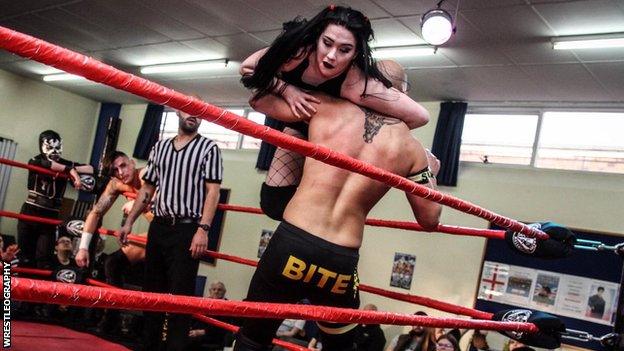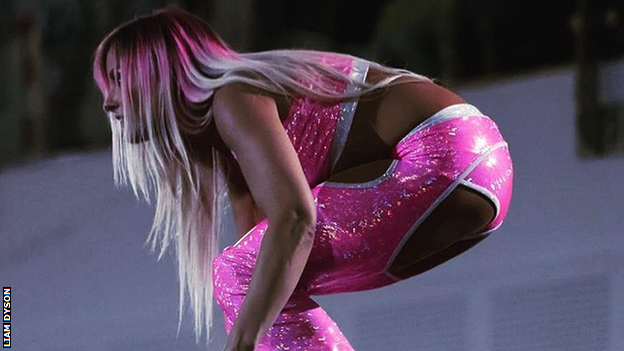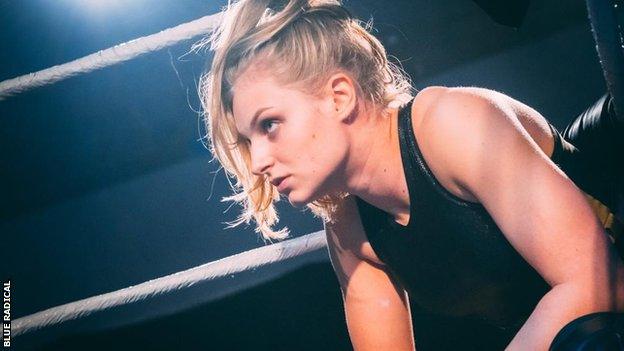#SpeakingOut: Sexual misconduct in British professional wrestling's #MeToo moment
- Published

Lucia Lee - one of the wrestlers to come forward about their experiences
"He had this position of power over me and I was scared to leave - because if I left I'd have to stop training."
Wrestler Millie McKenzie was 17 when she entered into a relationship with her then 30-year-old coach.
McKenzie was one of several female colleagues to come forward in the space of a few days in June, alleging widespread abuse and sexual harassment in British professional wrestling - an 'entertainment' industry run by various fight promoters and inspired by the glamour and theatrics of its US counterpart the World Wrestling Entertainment (WWE).
BBC Sport has spoken to several female wrestlers, campaigners and promoters about the #SpeakingOut campaign - described as the wrestling industry's #MeToo moment - and what happens next.
What the alleged victims said
Female wrestlers explain why they're #SpeakingOut about abuse
McKenzie accused her former trainer and New Zealand-born wrestler Travis Banks of emotional abuse during their relationship.
"I hated wrestling. I hated everyone. I didn't talk to anyone," she said. "I just didn't want to be there because I'd had to have been around him and all his friends."
Banks, who was also released by the WWE's NXT UK promotion, gave BBC Sport a statement in response, saying: "I apologise again for the pain that was caused. This was an entirely consensual relationship but I recognise that what happened should not have happened.
"I support the efforts being made by the Speaking Out movement to enable everyone in wrestling, and other sports also, to feel safe and never have to face a similar situation."
Lucia Lee, 18, was another wrestler who came forward.
In June she claimed young women were "slut shamed" and referred to as "ring rats", accused by male colleagues of having "slept their way on to shows".
Speaking to BBC Sport, Lee said: "After my first match - I was 16 - there was a 30-something-year-old man backstage. Everyone congratulated me and he just sort of gave me a massive hug and whispered into my ear, 'your arse looked amazing during that match'.
"The conversation was so needed at the time. I can't imagine what would have happened if we had not had this conversation because these people would still be in the business.
"The worry is that whenever you go to a promoter or a trainer you never know what their response is going to be.
"If you speak up against someone that's on big shows, they can start going around to each individual promotion and saying 'don't book her, she's a troublemaker; don't book her she's a ring rat'."
Wrestler Erin Angel was also involved in the movement and has been actively encouraging women to speak out.
"Once it started a lot of us were really ready to tell our stories and say this isn't right and we want change, we want difference and we want to make it better," she said.
"I thought it was just happening to me, and I'm sure that every girl that was in that situation was feeling the same.
"I have fought since I was 16 to be in this industry. It's not about those men - it's about pursuing your dream and you don't realise how unwanted you are in the industry with those sorts of people or how little you mean to them."

Erin Angel made her competitive wrestling debut aged 16
Many of the alleged victims blamed a 'locker room' culture in wrestling that allowed misconduct to happen.
"All of a sudden, they're really good at wrestling, and they're popular," said McKenzie. "They've never been cool. All of a sudden, they've got this newfound fame and everyone's mates with him and all the girls are messaging them."
Lee added: "When people start getting a little bit of attention, start getting a little bit famous, they think that they can basically do whatever they want and live that sort of rock 'n' roll lifestyle.
"And unfortunately that comes at the expense of the women more than anything."
Angel told BBC Sport that, without any authority running British wrestling, "there are no rules".
"You can walk into this business and say and do what you like without there being checks on you," she said.
'Wrestling tainted with harrowing stories of abuse'
On Friday, Labour MP and wrestling fan Alex Davies-Jones helped launch a parliamentary inquiry, external into professional wrestling. Days earlier she had raised the SpeakingOut movement in Parliament during a debate on misogyny in sport.
"The disturbing reality and lived experience for many female wrestlers is, more often than not, entrenched in misogyny," she said.
"I have heard horrific tales from female wrestlers who were faced with threats of rape or sexual assault, all in the name of 'friendly banter'.
"I have also heard from women as young as 13 or 14 who, at the start of their careers, were the targets of vile behaviours that saw male wrestlers competing to be the one to take their virginity."
Davies-Jones said the #SpeakingOut movement had left the wrestling industry "tainted with its harrowing stories of emotional and sexual abuse" and questioned what was being done when there was "no governing body to hold to account".
"Who should these young women turn to?" the MP asked, telling BBC Sport: "Wrestling has fallen through the gaps because it's not necessarily a sport."

Millie McKenzie made her professional debut in 2016
How did the movement start?
The first allegations against an individual US wrestler were made - and denied - on 17 June 2020.
Very quickly, more wrestlers, promoters, and other people in the industry were accused of sexual misconduct, with people using the hashtag #SpeakingOut as they shared their stories on social media.
A wave of suspensions and sackings followed in the UK and the US, including big names from WWE such as Ligero - who denied an allegation of indecent assault by one wrestler, but did apologise for "my action and any hurt I've caused" over separate claims he made unwanted sexual advances to two other female wrestlers.
Two days on, BBC journalist Jonathan Savage reported, external that West Yorkshire Police were "carrying out initial enquiries" into allegations of a number of cases of abuse reported by female wrestlers.
McKenzie was one of the women who came forward in the first few days as fans and performers demanded change. She is now part of a global movement across professional wrestling.
"This movement has been so big that something has to happen and it's needed to happen for so long," she told BBC Sport. "If it falls on deaf ears again then what hope do we have?"
What happens next?
Several MPs, along with women from the #SpeakingOut movement have now formed an 'All-Party Parliamentary Group for Wrestling' chaired by MP Alex-Davies Jones - looking at setting up a regulatory body for the industry.
Equity, a trade union for entertainers, has suggested five pledges to regulate British wrestling, including safeguarding and 'dignity at work' policies, separate dressing rooms at shows and agreed transport and accommodation arrangements.
In the wake of #SpeakingOut, with coronavirus putting restrictions on fans and events, some UK promoters paused their lives shows.
Progress Wrestling told BBC Sport: "We've all got to be great for this industry to work and to prevent another Speaking Out movement happening. Because if we're on the same level, we're on the same page, it's going to be safer for everyone."
Revolution Pro Wrestling CEO Andy Quildan said it wants "an independent body and we want to be held accountable".
He added: "British wrestling needs to focus on the word 'professional' in professional wrestling. In terms of fundamentally changing people's mindsets it's a change that needs to be made from the grassroots up."
WWE's NXT UK brand, which had several male wrestlers named in the #SpeakingOut movement, resumed this month.
WWE CEO Triple H recently told Metro, external that its NXT UK brand aimed to "professionalise" wrestling and that it takes "every allegation very seriously... it's zero tolerance for things of this manner".
Will things change?
Angel has started her own association to help address the issue and stressed the importance of wrestling fans using their "massive voice" for change.
"I don't think anybody has told fans before of what's happened or what's been happening," she said. "Fans have started to speak out and say we're not happy now watching these people."
McKenzie added: "My goal at the moment is to create a safer space and just be there for younger people, because I didn't really have anyone to talk to."
Lee said: "The main thing is going to be promoters keeping an eye on that talent, monitoring what's happening in locker rooms, having separate locker rooms for men and women. Just listening to people when they're reporting people.
"I'd really want girls to come in to wrestling and just enjoy wrestling for what it is - because it's an amazing thing."
If you've been affected by issues in this article, there is information and support available on BBC Action Line.